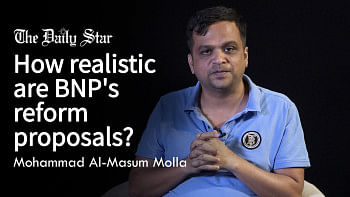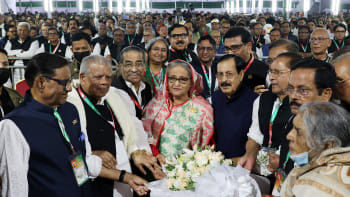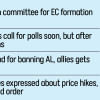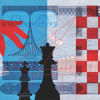Can Bangladeshi politics change its spots in 2023?

It will be a year of challenges, it will be a year of strife. It could also be a year of possibilities. It could be a year of change, too.
The year 2023 will be significant for Bangladesh's politics and economy. Election years typically feature greater strife between the two major opposing political camps. This year, however, that only seems to be further complicated, and so is the uncertainty over our collective fate.
Things were going fairly smooth for the ruling Awami League until the middle of 2022. The opposition, BNP, was still struggling to even gather enough resolve to be on the streets, and many had by then dismissed them as paper tigers.
The price hike of fuel and daily essentials, and severe load-shedding, put the ruling party in an awkward situation, which was only compounded by the fallout of the Russia-Ukraine war and corruption allegations against AL members.
BNP exploited that ripe opportunity quite well – taking advantage of the overall public dissatisfaction towards the government – and took to the streets. Two of its leaders were killed but instead of having their spirits dampened, the BNP became desperate.
The main opposition camp then held its divisional rallies, one after another, defying all odds and obstacles. It was a challenge for the BNP to prove its strength. And to everyone's surprise, the party surpassed all expectations with spectacular turnouts. The more aggressive the ruling party was in trying to quell the BNP's campaign, the more desperate BNP became to show up in numbers on the streets.

The situation was such that the AL had to come up with counter programmes, although the government higher-ups had said previously that they would allow the BNP to take to the streets. The government went on to arrest a number of BNP's senior leaders and denied them bail several times. This included the party's secretary general Mirza Fakhrul Islam Alamgir, who finally gained bail on Tuesday for six months.
To be fair, the government had initially granted some space to the BNP. But this was, at least in part, due to international pressure.
In December 2021, the US imposed sanctions on Rab and seven of its officers. Though the government seemed to not care much about this, its image before the international community was tarnished. It was evident from the way AL leaders, including ministers, talked about diplomats stationed in Dhaka that the government was under some pressure regarding the state of democracy and human rights in Bangladesh.
Diplomats have repeatedly said that, in order for the next general election to be accepted internationally, the opposition parties must be allowed to hold meetings. The government duly allowed the BNP to do so, but not without repression.
As the election is just a year away, last year's heat will spill over into 2023 and will continue till the election. Centring around the polls, the ruling Awami League has already commenced its election campaign as PM Sheikh Hasina started seeking votes publicly. The party also completed its 22nd national council, where it indicated that their next election manifesto would be "Smart Bangladesh." The AL has remained in office for three consecutive terms and is desperate to stay on. And thus, the constitution, which allows for the ruling party to hold elections, will be their main tool.
On the other hand, the BNP knows very well what would happen if they joined the polls under the incumbent government. Their experience in joining the polls under the AL has not been good, given the outcome of the last two elections, both of which were riddled with allegations and complaints of irregularities. So, they want the next national election to be held under an election-time neutral government. But chances are very slim that the ruling Awami League government will accept this demand. Meanwhile, the BNP has placed a 10-point demand, including demanding the resignation of the government.
To make their demands clearer, the party's lawmakers have resigned from the parliament. Through this resignation, the BNP wanted to convey that they will not join the polls unless their demands are met. They are ready to boycott the election again, although some in the party still rue their previous decision to boycott the 2014 election.
Apart from this, the BNP has also started waging simultaneous campaigns with like-minded political parties – although many exist in name only – to mount pressure on the government. As part of the simultaneous movement, the party unofficially dissolved its 20-party alliance in an attempt to bring left-wing parties under a single platform.
By the end of 2022, some leftist parties were also supporting BNP's demand for conducting the election under a non-partisan interim government. It seems that all the opposition forces are uniting against the ruling AL.
The position of the Jatiya Party, however, is not clear, and the party itself is highly unpredictable. It can do anything at any moment. After the death of its founder, HM Ershad, the party's top leadership remains divided between Ershad's brother, GM Quader, and Ershad's wife, Rawshan Ershad. Rawshan emerged from hospital after a long absence, while party chairman Quader was making the rounds of court to regain authority. In the meantime, the AL has been drawing up various strategies to keep the JP under its control.
Political leaders also engaged in a battle of words throughout 2022. But what the people had expected – a mutual understanding between the major political parties – remained far from reach. There seems to be no possibility of holding any talks between the AL and BNP. So, in the absence of talks, there is only confrontation.
Although the year ended with a sigh of relief that nothing too consequential had happened centring BNP's December 10, 2022 rally in Dhaka, the government had been tough on the opposition party.
The year 2023 started with uncertainty, which may further deepen in the coming days as AL and BNP seem to increasingly believe they are not just political opponents, but rather enemies. So, chances of reaching a consensus are almost nil.
While the Awami League is resolute on holding the general election, the BNP is desperate to force it to resign from office.
The stalemate can only mean imminent confrontation. And to avoid that, both parties must come to a consensus. Otherwise, there are bound to be clashes and instability. Lives and livelihoods will be lost. And it will be the AL and the BNP who will have blood on their hands.
Mohammad Al-Masum Molla is deputy chief reporter at The Daily Star.

 For all latest news, follow The Daily Star's Google News channel.
For all latest news, follow The Daily Star's Google News channel. 










Comments